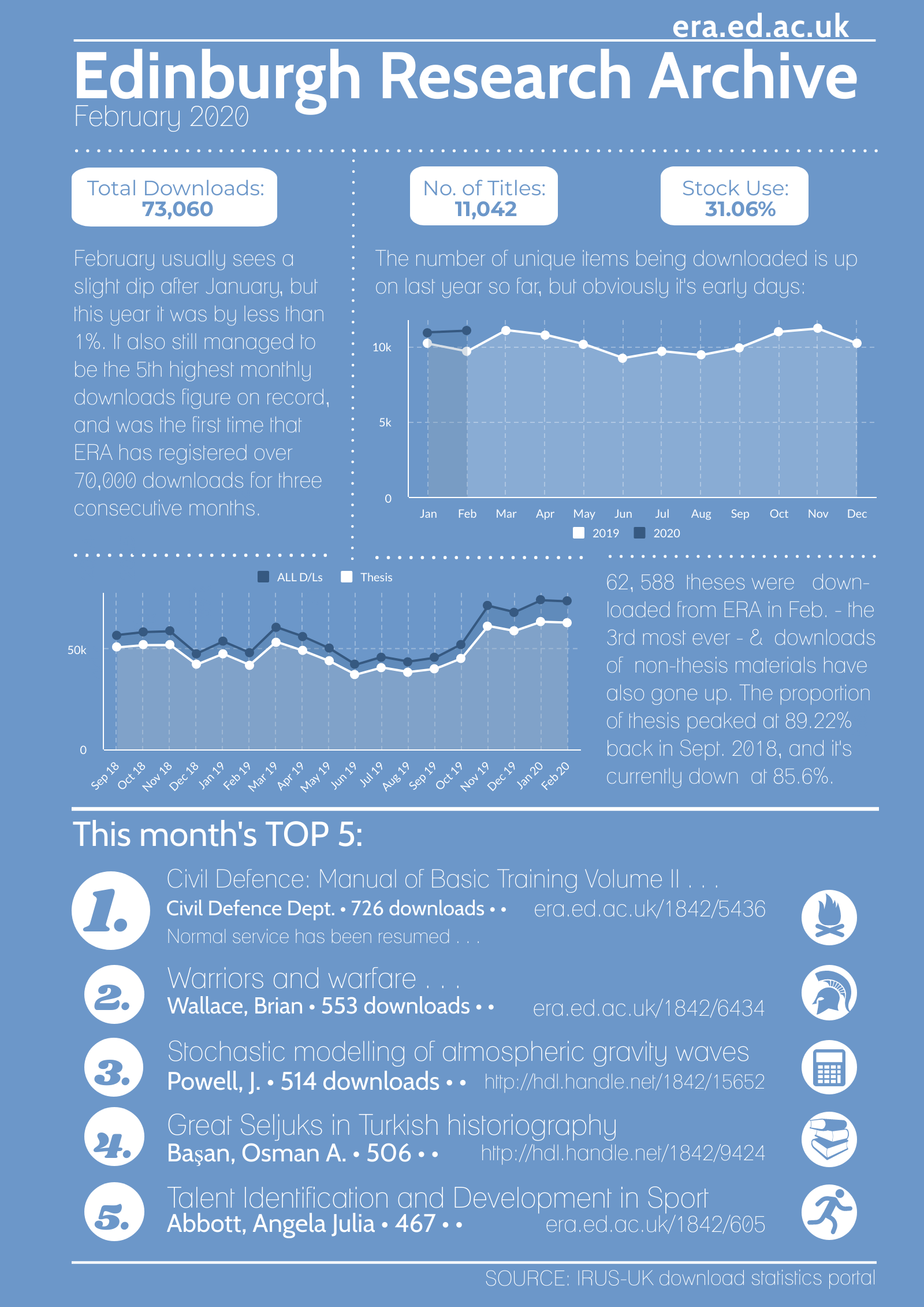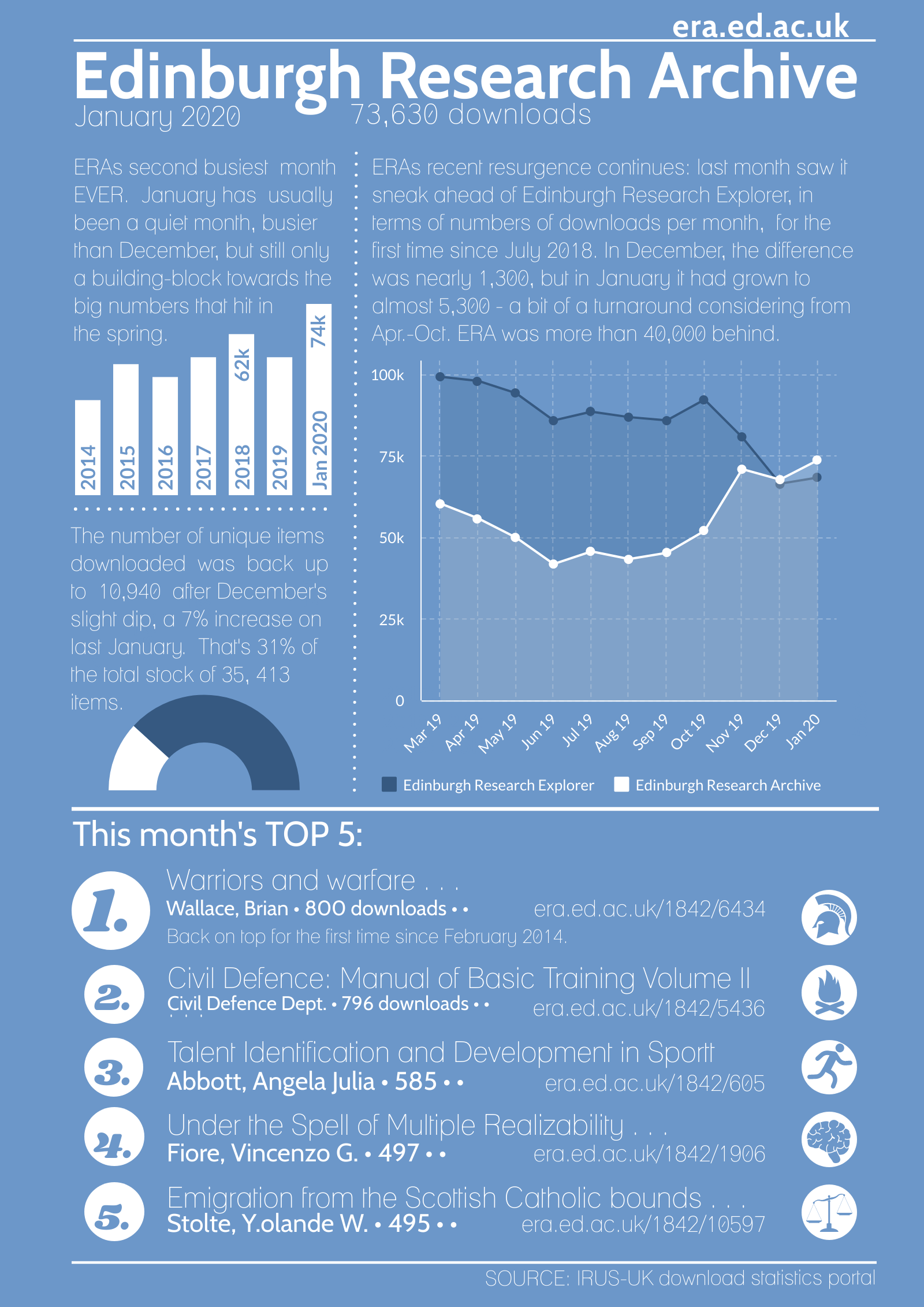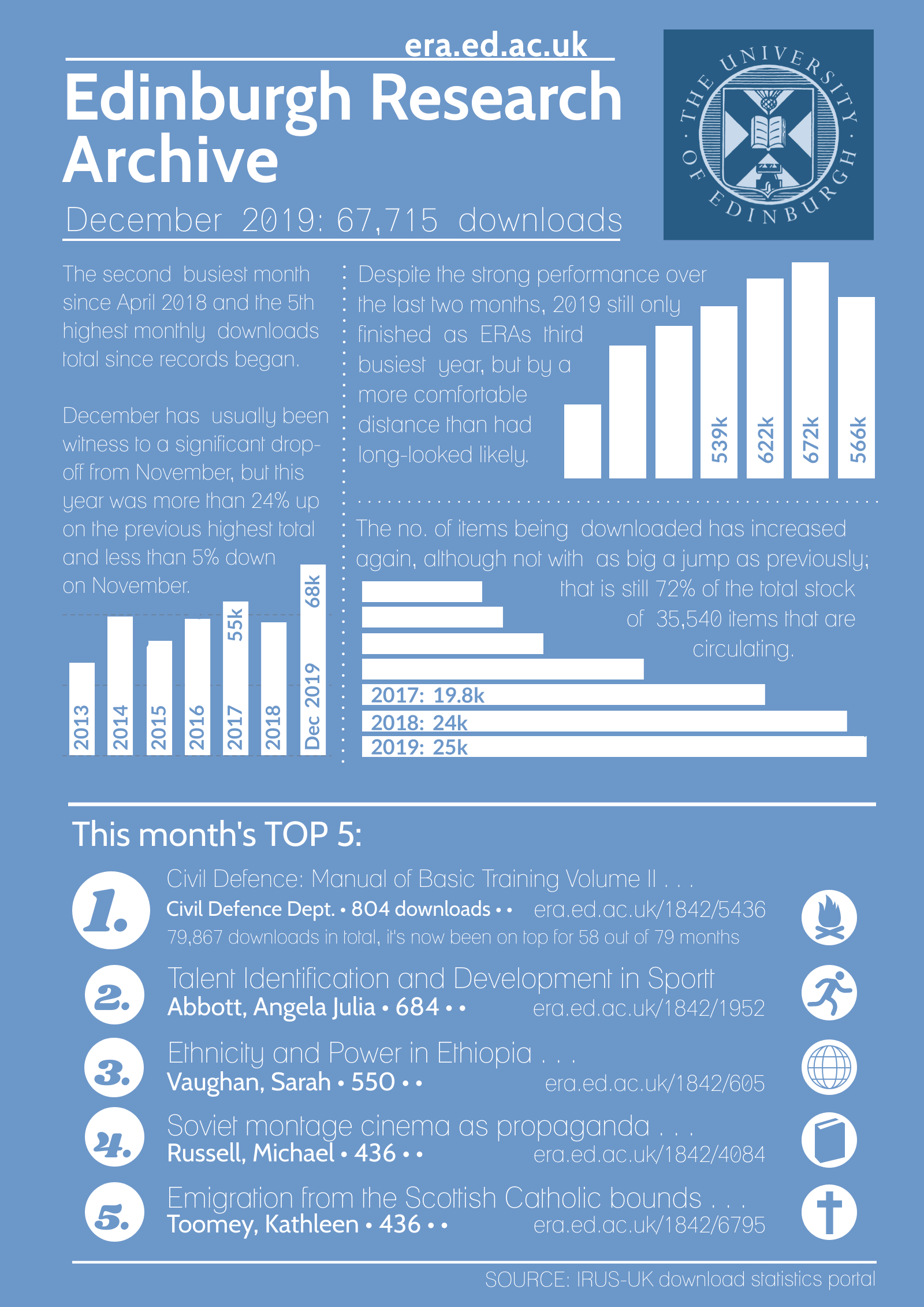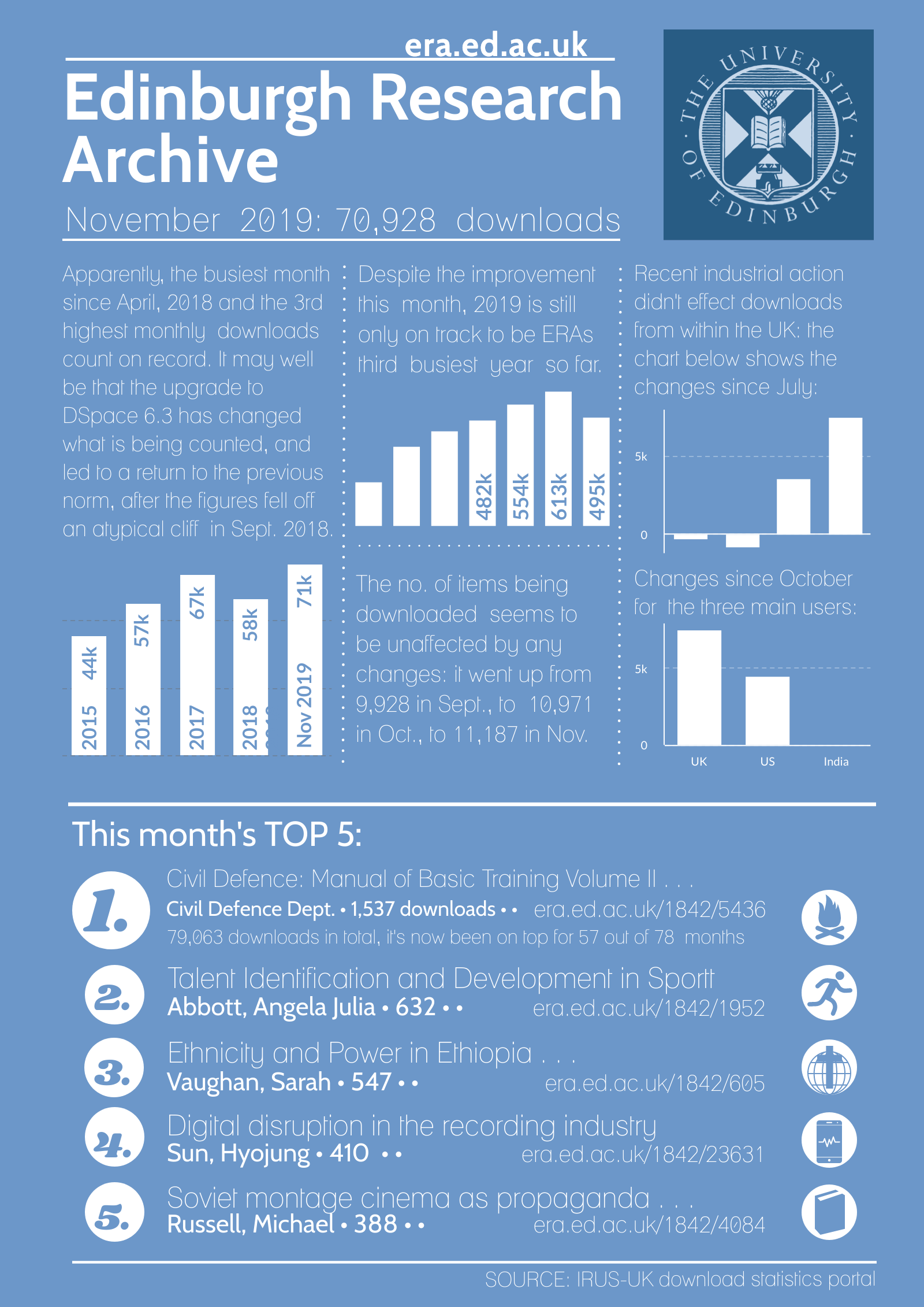Tag Archives: phd
Edinburgh Research Archive Statistics: January 2020
Edinburgh Research Archive Statistics: December 2019
Edinburgh Research Archive Statistics: November 2019
Beginning of a new ERA
We are pleased to announce that the Edinburgh Research Archive (ERA) has recently had a lot of work done to improve it’s looks, add new functionality and clean up some of our collections data.
For those of you who are not familiar with ERA it is is a digital repository of original research produced at The University of Edinburgh. The repository contains documents written by, or affiliated with, academic authors, or units, based at Edinburgh that have sufficient quality to be collected and preserved by the Library, but which are not controlled by commercial publishers. Holdings include around 27,000 full-text digital doctoral theses, 1,500 masters dissertations, and numerous other project reports, briefing papers and out-of-print materials. In October 2019 we recorded 223,000 visitors to ERA who downloaded 51,984 items.
Details of some of the improvements are listed below:
| Software upgrade | The DSpace platform was upgraded from version 4.2 to 6.3 | ||
| Face lift | Visual redesign and styling ERA to make it more appealing | ||
| DOI allocation | New functionality to assign DOIs to deposited items | ||
|
New domain |
New URL => era.ed.ac.uk | ||
| Fix subject terms | Change scanning metadata information to be stored in dc.relation.ispartof and not dc.subject. |
✔ |
|
| Log-in expiry time | Set login expiry time to an hour. |
✔ |
|
| Date-format | Go from yyyy-mm-dd to dd-mm-yyyy |
✔ |
|
| UX improvements |
Move Edit Item button up, to the top of the bar, customise drop down list to have most used elements at the top. |
❌ |
|
| Default language boxes | Give “en” as default to language boxes. |
Of all the new improvements I am most excited about the new functionality to assign Digital Object Identifiers (DOIs) to items deposited in ERA. All new items will be automatically assigned a DOI, and we will investigate how to do this for the rest of the nearly 35,000 items already online.
20,000th item in the Edinburgh Research Archive
We are delighted to announce the deposit of the 20,000th item into our institutional repository the Edinburgh Research Archive (ERA). ERA is a digital repository of original research which contains documents written by academic authors based at, or affiliated with, the University of Edinburgh that have sufficient quality to be collected and preserved by the Library, but which are not controlled by commercial publishers. Holdings include full-text digital doctoral theses, masters dissertations, project reports, briefing papers and out-of-print materials.
Our milestone 20,000th item is a PhD thesis written by Susan Ahrens at the Moray House School of Education and was awarded in 2016:

2016 Homeless World Cup in Glasgow : image courtesy of the BBC (http://www.bbc.co.uk/news/uk-scotland-36819350)
This work investigates the relationship between sport, homelessness and poverty, and considers the way two social enterprises – the Homeless World Cup and Street Soccer (Scotland) – help overcome homelessness and its associated effects.
International Earth Day
Tuesday 22nd April has been designated by the UN as International Mother Earth Day. It is a day of action where people from all over the planet do something on behalf of the environment – through local campaigns to pick up litter, plant trees and clean up their communities, to online activism to contact their elected officials and influence policy changes. The University of Edinburgh contributes in part by carrying out original research and freely sharing this knowledge with the world adding to the growing global body of knowledge.
We wanted to highlight some of the materials in our Open Access collections that looks at research themes closely related to #MotherEarthDay – including sustainable development, renewable energy and global climate change:
1. Reducing uncertainty in predictions of the response of Amazonian forests to climate change (Lucy Rowland, PhD 2013)
Our understanding of global climate change is mainly based on computer modelling. To date there are few studies which have comprehensively tested vegetation models using ecological data from Amazon forests. Using data this thesis presents an investigation of how tropical forests respond to changes in climate and with what certainty scientists can model these changes in order to predict the response of Amazon forests to predicted future climate change.
2. Climate change uncertainty evaluation, impacts modelling and resilience of farm scale dynamics in Scotland (Michael Rivington, PhD 2011)
Climate change is a global phenomena that will have a wide range of local impacts on land use. The work undertaken in this PhD thesis indicates that agriculture in Scotland has the potential to cope with the impacts but that substantial changes are required in farming practices
3. Making sustainable development a reality: A study of the social processes of community-led sustainable development and the buy-out of the Isle of Gigha, Scotland (Robert Didham, PhD 2007)
This PhD thesis examines the concept of sustainable development with a primary focus on its advancement and implementation at a local level. This work is based on original ethnographic research that was conducted on the Isle of Gigha, Scotland following the community buy-out of the island that occurred in 2002.
4. Climate change and renewable energy portfolios (Dougal Burnett, PhD 2012)
The UK has a commitment to reduce greenhouse gases by at least 80% from 1990 levels by 2050. This will see the proportion of energy generated in the UK from renewable resources such as wind, solar, marine and bio-fuels is increasing and likely to dominate the future energy market over the next few decades. This PhD thesis explores the influence of climate change on renewable electricity generation portfolios and energy security in the UK, with the aim of determining if climate change will affect renewable energy resource in such a way that may leave future low carbon generation portfolios sub-optimal.
5. An Assessment of the Impact of Climate Change on Hydroelectric Power (Gareth Harrison, PhD 2001)
This PhD thesis describes a methodology to assess the potential impact of climatic change on hydropower investment, and details the implementation of a technique for quantifying changes in profitability and risk. A case study is presented as an illustration, the results of which are analysed with respect to the implications for future provision of hydropower, as well as our ability to limit the extent of climatic change.





